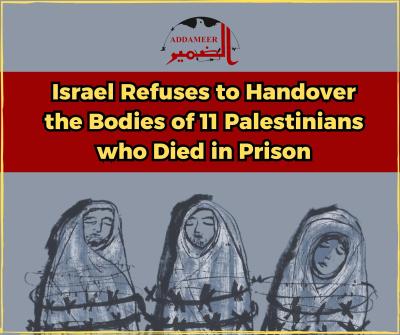
The Israeli occupation authorities continue to refuse to release the bodies of 11 Palestinians who died while in Israeli incarceration out of the 237 prisoners who have died within Israeli prisons since 1967. Among the martyrs whose bodies are detained are: Anis Doula, whose body has been held since 1980, Aziz Oweisat, whose bodies have been detained since 2018, Fares Baroud, Nassar Taqatqa, and Bassam As-Sayeh, whose bodies have been detained since 2019, Saadi Al-Gharably and Kamal Abu Wa’er, whose bodies have been detained since 2020, Sami Al-Ammour, whose body has been detained since 2021, Dawood Az-Zbeidi and Naser Abu Hameid, whose body has been detained since 2022. The latest is Khader Adnan, who passed away on May 2, 2023, after an 86-day hunger strike in protest of his arbitrary detention.
The detention of the bodies falls within the policy of collective punishment exercised by the Israeli occupation authorities against the Palestinian people. The occupation holds the bodies in refrigerators and numbered graves without the slightest consideration for any humanitarian standards. According to the National Campaign for Retrieving the Bodies of Martyrs, the number of martyrs whose bodies are held in numbered graves has reached 252, while 142 other martyrs’ bodies have been held in refrigerators since 2015, including 14 bodies of child martyrs and five bodies of female martyrs.
In this context, the Israeli Supreme Court issued a decision on December 14, 2017, accepting a request submitted by several human rights institutions on behalf of the families of martyrs whose bodies are held. The Supreme Court at that time prohibited the continued detention of the martyrs' bodies based on international law that prohibits the detention of the bodies of martyrs. However, the Israeli Attorney General held an additional session with seven judges, during which the Supreme Court agreed to hold the session and froze the implementation of the decision. On September 9, 2019, the Supreme Court issued a decision by a majority of 4 judges to 3, reversing its previous decision regarding the release of the detained martyrs' bodies. In its latest decision, the Supreme Court relied on the Israeli Emergency Law, which allows the military governor to bury the bodies of martyrs and hold them for the purpose of using them as a leverage card in any future negotiations and exchanges that can be made with Palestinians and their factions
The Israeli Supreme Court's decision is a dangerous precedent within the racist policies practiced by the occupation state against Palestinians. The Israeli judiciary has often acted as an arm of the Israeli government and army in many of its rulings. With this decision, the occupation's judiciary once again demonstrated its ability to violate the most basic principles of human rights recognized by the international community, agreements, and norms that are globally accepted in order to appease the occupation's policies.
Addameer Prisoner Support & Human Rights Association calls on the Occupying Power to respect international law, specifically the Fourth Geneva Convention and the First Additional Protocol to the Geneva Conventions. These are integral parts of international law binding on all states. Article 130 of the Fourth Geneva Convention states that deceased detainees should be buried with respect to their religious rites, and their graves should be respected and preserved. Article 34 of the First Additional Protocol to the Geneva Conventions prohibits the desecration of the remains of persons who died as a result of occupation or during detention.